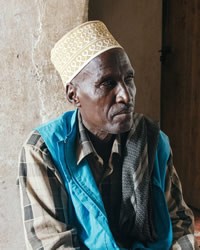Orma in Kenya

Photo Source:
Anonymous
|
Send Joshua Project a map of this people group.
|
| People Name: | Orma |
| Country: | Kenya |
| 10/40 Window: | No |
| Population: | 160,000 |
| World Population: | 160,000 |
| Primary Language: | Orma |
| Primary Religion: | Islam |
| Christian Adherents: | 0.10 % |
| Evangelicals: | 0.00 % |
| Scripture: | New Testament |
| Ministry Resources: | Yes |
| Jesus Film: | Yes |
| Audio Recordings: | Yes |
| People Cluster: | Oromo |
| Affinity Bloc: | Horn of Africa Peoples |
| Progress Level: |
|
Introduction / History
The Orma are semi-nomadic people who live in the southeastern parts of Kenya in Tana River and Lamu districts. Some key Orma cities are Hola (the capital of Tana River District), Garsen, Tarasaa and Witu.
The Orma are one of the clans of the greater Oromo people, commonly associated with Ethiopia. In the late nineteenth century, wars with neighboring tribes forced the Orma clan to migrate south. Some moved to the rich delta area of the lower Tana River and others settled west of the river.
What Are Their Lives Like?
Though the Orma basically survive by raising cattle, they also raise goats and sheep. Their distinct breed of the white, long-horned zebu cattle are among the finest in Africa. The cows are commonly known as Borana cows (with a hump). Zebu are used as a bride price and are slaughtered at weddings and funerals. They keep cattle and move to the higher grounds during the rainy season when the Tana River floods. They move with their herds inland. Men who own more than 1,000 head of cattle are granted special recognition in their communities.
They also eat maize, rice, beans and drink chai. The arid Tana region is not very favorable for growing produce; therefore, they have few vegetables in their diet. Any produce they obtain must be bought from another tribe. This is not an easy task since the shortage of watering holes often leads to bloody clashes between tribes.
The Orma live in round, wood-framed huts built by the women. The huts are thatched with grass and in some cases with woven mats. In some cases when the family migrates with the herds due to drought, they leave the frame of their homes behind, only carrying the mats. They will often return to the same site when rains return. A larger version of these huts is built for those who live in permanent villages.
An Orma man traditionally has only one wife, even though polygamy is allowed now that the Orma are almost exclusively Muslim. Special ceremonies are performed at the birth of children. Babies are dedicated seven days after they are born. A woman stays secluded for forty days after giving birth. Then, a feast is held with the other women in the village and the baby is dedicated a second time. The firstborn child of either sex is named after one of the paternal grandparents.
Among the Orma, the line of descent is traced patrilineally, or through the males. Masculinity in attitudes, rituals and symbolism is customary. They value bravery and military prowess. One gains status by killing dangerous animals or human enemies.
The Orma have their own unique form of music. Dance is important to them, and they enjoy it during celebrations and ceremonies. They pass down folk tales and legends from one generation to the next.
What Are Their Beliefs?
The Orma are almost all Muslim and have been so for three or four generations. They are devoted in their faith, observing all the rites and religious festivals of Islam. Most of the Orma have never heard the name of Jesus. If they have heard His name, it has been through the Islamic teachings that Jesus was simply a prophet, teacher, or good man, but not that he is God's Son.
The original religion of the Orma included belief in a creator God associated with the sky. They recognized the existence of many spirits and associated them with various locations in nature such as mountain tops, trees, groves, rivers and wells. These beliefs have now apparently been combined with their Islamic beliefs.
What Are Their Needs?
The Orma people do not know about the wonderful grace of Jesus. Kenya is perhaps the most Christianized country in Africa, but there is usually animosity between the Orma and neighboring tribes.
Prayer Points
Pray for expatriate and Kenya national missionaries, all of whom are working cross-culturally.
Pray as other Christian groups come to reach the Orma, that they will not put down the work of those who have been there for years, causing division and confusion for the Orma.
Pray for effectiveness of Kenyan Bible translators working through Bible Translation and Literacy (BTL).
Pray for completion of Bible translation in the Orma language.
Pray for the easy availability of the JESUS Film in the Orma language.